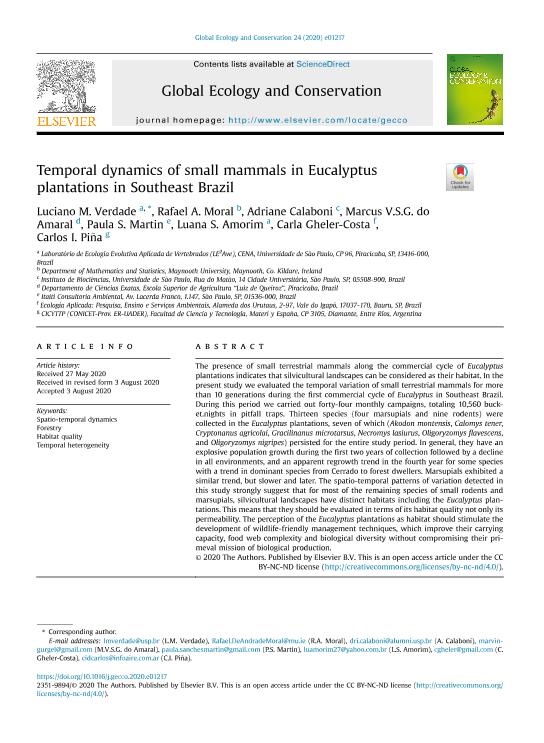Mostrar el registro sencillo del ítem
dc.contributor.author
Verdade, Luciano Martins

dc.contributor.author
Moral, Rafael de Andrade

dc.contributor.author
Calaboni, Adriane

dc.contributor.author
do Amaral, Marcus V. S. G.
dc.contributor.author
Martin, Paula S.

dc.contributor.author
Amorim, Luana S.
dc.contributor.author
Gheler Costa, Carla
dc.contributor.author
Piña, Carlos Ignacio

dc.date.available
2021-10-04T20:43:10Z
dc.date.issued
2020-12
dc.identifier.citation
Verdade, Luciano Martins; Moral, Rafael de Andrade; Calaboni, Adriane; do Amaral, Marcus V. S. G.; Martin, Paula S.; et al.; Temporal dynamics of small mammals in Eucalyptus plantations in Southeast Brazil; Elsevier; Global Ecology and Conservation; 24; 12-2020; 1-11; e01217
dc.identifier.issn
2351-9894
dc.identifier.uri
http://hdl.handle.net/11336/142561
dc.description.abstract
The presence of small terrestrial mammals along the commercial cycle of Eucalyptus plantations indicates that silvicultural landscapes can be considered as their habitat. In the present study we evaluated the temporal variation of small terrestrial mammals for more than 10 generations during the first commercial cycle of Eucalyptus in Southeast Brazil. During this period we carried out forty-four monthly campaigns, totaling 10,560 bucket.nights in pitfall traps. Thirteen species (four marsupials and nine rodents) were collected in the Eucalyptus plantations, seven of which (Akodon montensis, Calomys tener, Cryptonanus agricolai, Gracilinanus microtarsus, Necromys lasiurus, Oligoryzomys flavescens, and Oligoryzomys nigripes) persisted for the entire study period. In general, they have an explosive population growth during the first two years of collection followed by a decline in all environments, and an apparent regrowth trend in the fourth year for some species with a trend in dominant species from Cerrado to forest dwellers. Marsupials exhibited a similar trend, but slower and later. The spatio-temporal patterns of variation detected in this study strongly suggest that for most of the remaining species of small rodents and marsupials, silvicultural landscapes have distinct habitats including the Eucalyptus plantations. This means that they should be evaluated in terms of its habitat quality not only its permeability. The perception of the Eucalyptus plantations as habitat should stimulate the development of wildlife-friendly management techniques, which improve their carrying capacity, food web complexity and biological diversity without compromising their primeval mission of biological production.
dc.format
application/pdf
dc.language.iso
eng
dc.publisher
Elsevier

dc.rights
info:eu-repo/semantics/openAccess
dc.rights.uri
https://creativecommons.org/licenses/by-nc-nd/2.5/ar/
dc.subject
FORESTRY
dc.subject
HABITAT QUALITY
dc.subject
SPATIO-TEMPORAL DYNAMICS
dc.subject
TEMPORAL HETEROGENEITY
dc.subject.classification
Conservación de la Biodiversidad

dc.subject.classification
Ciencias Biológicas

dc.subject.classification
CIENCIAS NATURALES Y EXACTAS

dc.title
Temporal dynamics of small mammals in Eucalyptus plantations in Southeast Brazil
dc.type
info:eu-repo/semantics/article
dc.type
info:ar-repo/semantics/artículo
dc.type
info:eu-repo/semantics/publishedVersion
dc.date.updated
2021-09-07T14:09:06Z
dc.journal.volume
24
dc.journal.pagination
1-11; e01217
dc.journal.pais
Países Bajos

dc.journal.ciudad
Amsterdam
dc.description.fil
Fil: Verdade, Luciano Martins. Universidade de Sao Paulo; Brasil
dc.description.fil
Fil: Moral, Rafael de Andrade. Universidade de Sao Paulo; Brasil
dc.description.fil
Fil: Calaboni, Adriane. Universidade de Sao Paulo; Brasil
dc.description.fil
Fil: do Amaral, Marcus V. S. G.. Maynooth University; Irlanda
dc.description.fil
Fil: Martin, Paula S.. Itaiti Consultoria Ambiental; Brasil
dc.description.fil
Fil: Amorim, Luana S.. Universidade de Sao Paulo; Brasil
dc.description.fil
Fil: Gheler Costa, Carla. Ecologia Aplicada: Pesquisa, Ensino e Serviços Ambientais; Brasil
dc.description.fil
Fil: Piña, Carlos Ignacio. Provincia de Entre Ríos. Centro de Investigaciones Científicas y Transferencia de Tecnología a la Producción. Universidad Autónoma de Entre Ríos. Centro de Investigaciones Científicas y Transferencia de Tecnología a la Producción. Consejo Nacional de Investigaciones Científicas y Técnicas. Centro Científico Tecnológico Conicet - Santa Fe. Centro de Investigaciones Científicas y Transferencia de Tecnología a la Producción; Argentina
dc.journal.title
Global Ecology and Conservation
dc.relation.alternativeid
info:eu-repo/semantics/altIdentifier/url/https://www.sciencedirect.com/science/article/pii/S2351989420307587
dc.relation.alternativeid
info:eu-repo/semantics/altIdentifier/doi/http://dx.doi.org/10.1016/j.gecco.2020.e01217
Archivos asociados
